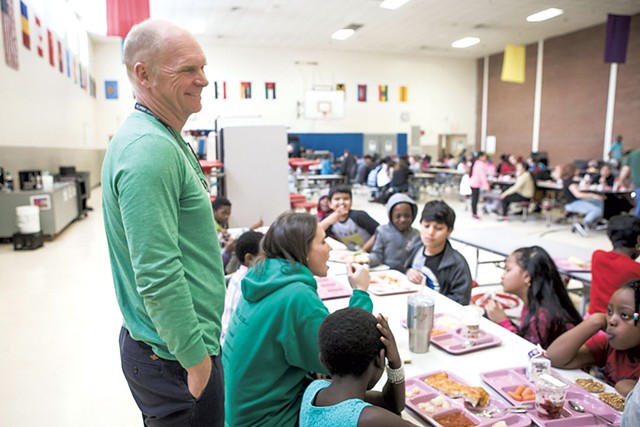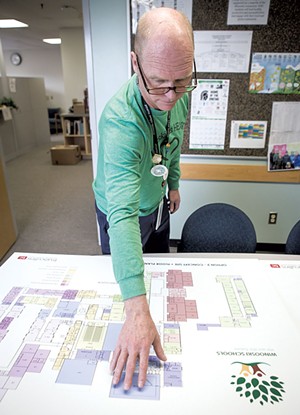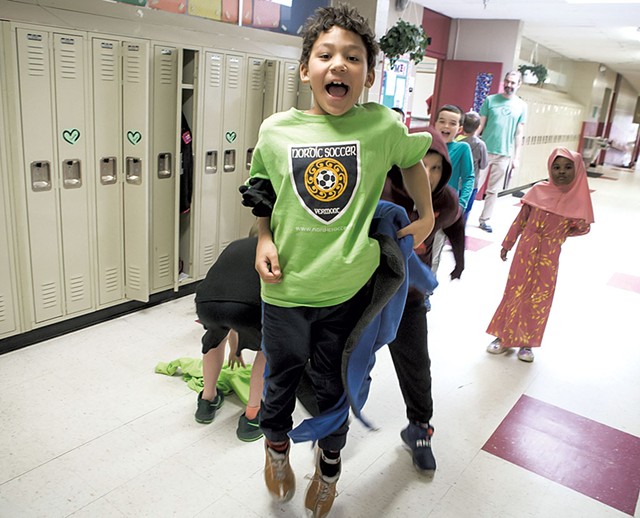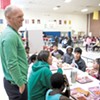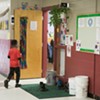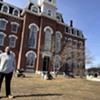Switch to the mobile version of this page.
Vermont's Independent Voice
- News
- Arts+Culture
- Home+Design
- Food
- Cannabis
- Music
- On Screen
- Events
- Jobs
- Obituaries
- Classifieds
- Personals
Browse News
Departments
Browse Arts + Culture
View All
local resources
Browse Food + Drink
View All
Browse Cannabis
View All
-
Culture

'Cannasations' Podcaster Kris Brown Aims to 'Humanize'…
-
True 802

A Burlington Cannabis Shop Plans to Host…
-
Business

Judge Tosses Burlington Cannabiz Owner's Lawsuit
-
Health + Fitness

Vermont's Cannabis Nurse Hotline Answers Health Questions…
-
Business

Waterbury Couple Buy Rare Vermont Cannabis License
Browse Music
View All
Browse On Screen
Browse Events
View All
Quick Links
Browse Classifieds
Browse Personals
-

If you're looking for "I Spys," dating or LTRs, this is your scene.
View Profiles
Special Reports
Pubs+More
Published May 1, 2019 at 10:00 a.m.
A student talent show brought parents, grandparents, sisters and brothers to the Winooski schools auditorium on a Friday night at the end of March. The toddlers among them cavorted happily below the stage, creating an impromptu program of their own — even after a red velvet curtain opened to reveal a stage with a festive sign that read "Celebrating Winooski's Talent."
School board member Margaret Bass emceed the event. "Let's give them another round of applause," she urged after eight youngsters sawed their way through a beginner violin sequence. "Does Winooski have talent?" Bass asked the crowd.
"Yes!" the audience responded loudly.
One girl danced a ballet solo in a fluffy pink dress. Another sang and recited a number from Hamilton. Kids did gymnastics, standup comedy and improv routines.
"What's the best school district in the state of Vermont?" Bass shouted.
The crowd roared in response: "Winooski!"
That kind of school spirit hasn't always been evident in the 7,200-population mill town. For years, voters were fickle about backing education budgets. Steady turnover of teachers and principals created instability, and the student body consistently scored below average on standardized tests.
The superintendent job became a revolving door, too. In 2012, the school board was searching for its sixth CEO in eight years.
"When we were looking for a superintendent back in 2012, 2013, we as a district were a bit disheveled," said school board president Mike Decarreau. "We were looking for someone who could bring direction, focus and peace."
To lead the most diverse district in the state, officials tapped a middle-aged white guy named Sean McMannon, who was then the principal of suburban Champlain Valley Union High School in Hinesburg.
In his six years on the job, the soccer-loving, ex-Peace Corps volunteer has earned praise — and awards — for increasing staff morale and teacher retention and expanding nutrition and health programs. He's bolstered English instruction for students, 40 percent of whom began their lives speaking a different language.
Fifty-eight percent of Winooski's 884 students are black, Asian, Hispanic or multiracial, according to the Vermont Agency of Education, making Winooski the only "minority-majority" district in overwhelmingly white Vermont.
"We have this incredibly diverse and unique experience to offer," McMannon said of the school community. Winooski kids go home to young hipsters, descendants of French Canadian and Irish mill workers, and newcomers from Nepal, the Democratic Republic of the Congo and Somalia.
"The world looks a lot more like us than it does the rest of Vermont — that's pretty amazing to offer that," said McMannon.
Like other school districts in the state, Winooski has discussed consolidation scenarios over the years. The high school graduated just 38 seniors last year; it has 214 students today. The school offers only one foreign language — French — and a single Advanced Placement course in World History. Fielding varsity teams is difficult.
None of that has dulled McMannon's enthusiasm for the place. The week after the talent show, he watched the Winooski School Board vote 4-0 to advance his plan for the future: a $57.8 million renovation of the city's school complex, which dates back to the 1950s.
The superintendent stood smiling in the John F. Kennedy Elementary School library as school board members high-fived one another after the unanimous decision to put the question to the public.
A yes vote is not assured in the special election bond vote on May 7. But if it's approved, the investment will signal Winooski's commitment to operating a public school system through grade 12 for years to come.
'Purposeful Life'
McMannon, 50, grew up in a middle-class suburb of Detroit and attended an all-boys parochial high school in Bloomfield Hills. But his parents, he said, "came from abject poverty." His dad served in Vietnam and later landed a job at the Burroughs Corporation, where a manager and fellow veteran took him under his wing. The encouragement helped his dad professionally and personally, McMannon said.
"My father's story always reminds me that education, persistence, support — caring adults — can really change people's lives," McMannon said.
McMannon graduated from Penn State University in 1991 with a bachelor's degree in business logistics. He played central defender on the NCAA Division I varsity soccer team, fulfilling a dream. "It was my No. 1 sport," said McMannon.
He headed to Colorado for a snowboard-bumming stint and met his future wife, Jennifer Cromie. McMannon won her over by hosting a five-course dinner party. "He had this strawberry sauce that went on top of the meat," Jennifer recalled. "I was like, Wow, I don't know that many guys who can cook fancy meals like this."
McMannon joined the Peace Corps and started his first teaching job — in Botswana. He sent Jennifer letters as well as occasional rolls of film that, once developed, produced images of him riding a donkey, sporting a new ponytail and beard.
Eighteen months in, McMannon contracted schistosomiasis, a disease caused by parasitic worms, after a swim in Lake Malawi, and it forced him to return home. He reconnected with Jennifer, and they landed jobs at the Becket School in Pike, N.H., where he became a residential counselor for court-referred adolescent boys.
With grad school in mind, they gravitated to Boston. McMannon worked with students with special needs there until both he and Jennifer earned master's degrees at Lesley College in Cambridge in 1996. They married that summer and then headed to the tiny town of White Mountain, Alaska, pop. 190, to teach.
About 85 percent of its residents were indigenous Alaskans. "We did everything," McMannon recalled. "I did all of the special education from preschool to high school. I taught middle school math. I taught Spanish."
The couple loved "the incredibly different cultural experiences we had, like catching fresh salmon in the Fish River and crab in the Bering Sea, gathering berries, hunting moose and caribou, and sharing the meat with other families and village elders," McMannon recalled.
When the first of their two daughters, Brenna, was born, the elders gave her an Inuit name, Qunik, which means "snowflake."
In 1999, the family left for California to be closer to McMannon's parents; his mother had breast cancer. She had often helped families at church and others in need, McMannon recalled, and taught him that a "purposeful life is one that is ... helping others to raise themselves up."
Around then, McMannon began to meditate and became interested in Buddhism, which, he said, offers a belief in the "basic goodness" of people. Meditating helped McMannon "stay present," he said, to support his parents while his mother was ill. He still rises at 5 a.m. most mornings and meditates for 30 minutes.
After his mother's death, McMannon and his wife found jobs in Vermont. He started as a special education teacher at CVU in 2001, and by 2005 was principal of the school of 1,300 students — more than the entire student population in Winooski. CVU, which draws from four towns including well-to-do Shelburne and Charlotte, has a low poverty rate, high test scores and relatively few English language learners. In 2010 McMannon won the Robert F. Pierce Vermont Secondary Principal of the Year award.
"I loved CVU, and it's a great school," he said. But when the superintendent post in Winooski opened up, McMannon decided to apply. "One of the things I really missed was working with more ethnically diverse populations."
Another plus: The superintendent's office is in the school complex. "The richness of the experience for me was being around kids," McMannon explained.
He got the job and now earns $146,794 annually.
Rainbow Chen got to know the superintendent when she served as a student rep on the local school board and the Vermont State Board of Education. When she had problems, the 2017 Winooski High School graduate said, McMannon was a thoughtful listener. Now a sophomore at Brown University, Chen described McMannon as "genuinely empathetic. He cares about you as a person and not necessarily as a number or a student."
Education officials noticed him, too. Former Vermont education secretary Rebecca Holcombe said McMannon is one of the state's best superintendents. "Sean is a guy who knows how to get down to business," she said. "But he puts people first in everything."
From the start, McMannon identified health care and good nutrition as prerequisites for academic success. He worried that too many students were coming to school hungry, so he expanded food programs. In addition to getting breakfast, lunch and an after-school snack, students can take home bags of nonperishable free food every Friday to help their families get through the weekend. The Vermont Foodbank's VeggieVanGo distributes free fresh produce twice monthly in the school parking lot.
McMannon added "newcomer" classrooms for recently arrived immigrants at the elementary and middle school levels. He doubled the number of home-school liaisons who work with immigrant families in their native languages, to six. He helped set up in-school pediatrician visits.
He's been a decisive leader. In March, a newsletter mentioned a "cakewalk" at JFK Elementary's upcoming Fun Fair. Parents and others said that the phrase hearkened back to a racist tradition of the slavery era, and not just in the South. The University of Vermont's Kake Walk tradition, which died in the late 1960s, featured a blackface dance competition.
The PTO organizers defended the game, a variation on musical chairs in which children competed to stand on a gradually decreasing number of dots on the floor. They said the newsletter misidentified a harmless activity as a "cakewalk."
As the disagreement hit social media and email inboxes, McMannon quickly canceled the game. Any possibility of a racist connection made it wrong, he told Seven Days. In a letter to families, he explained that while organizers had "no racist intent," cakewalks promote racist stereotypes.
"I would reiterate that we are immensely and unabashedly proud to be the only racially minority-majority school in Vermont and experience every day the value of learning in a multi-racial, cultural and linguistic environment," McMannon wrote.
"I appreciated his response tremendously," said Nicole Mace, a former Winooski city councilor and the executive director of the Vermont School Boards Association, who has a daughter at JFK Elementary. His message, she said, was "quick and clear and really not equivocating."
The $57.8 Million Question
On a recent walk through the school complex, McMannon chatted and waved to students wearing baseball caps and jeans, as well as hijabs and floor-length skirts. Spotting a high school student in a Manchester United shirt, McMannon joked, "Do you really still support Man U?" The teen laughed. McMannon is up-front about his soccer loyalties. "I'm a huge Liverpool supporter," he revealed. "They are my team. I am rabid about them." Although he no longer plays soccer competitively, McMannon still looks the part. He runs, hikes and loves the outdoors.
This wasn't his first tour of the Winooski campus on Normand Street. McMannon has led parents, taxpayers and others through the building to make the case for the renovation. He's breakfasted and lunched with city leaders and business owners. He's invited key stakeholders into his office to chat.
Winooski's elementary, middle and high schools share a central entrance and are laid out in interconnected wings built between 1957 and 2000. The plan calls for rebuilding much of the 140,000-square-foot complex wing by wing, with completion set for 2022. Almost half the $57.8 million tab would go to replace aging roofing, floors, windows, electrical and heating systems.
Today, the school has one gym and a "gymteria," as McMannon calls it, which hosts the midday meal and then quickly gets converted for physical education classes. After renovations, the facility would have two gymnasiums and a separate cafeteria.
The existing performing arts center, with hand-me-down chairs from Saint Michael's College, would be rebuilt in the gymteria's space. The number of preschool classrooms would double from two to four to accommodate a wait list of children.
Elementary and middle school classrooms would be reconfigured in clustered "pods" with movable dividers that allow spaces to expand or shrink. Special education and other support staff offices would be moved closer to classrooms.
McMannon led Seven Days to the cramped, living room-size health office, where more than 100 staff and students might drop by during a school day. A wan-looking teen rested on a bed, and a washer and dryer hummed. Some children arrive in clothes that need to be washed; others dirty their outfits at recess. A cabinet stored medication for dozens of students who need doses for everything from epilepsy to asthma.
The renovation would create more space for health checks by the school nurses and the pediatricians who visit two mornings a week. The space would also include dental chairs, so children who now go off-site under a school-coordinated program could get the services without leaving the building.
The renovation would also expand office space for special education teachers.
The school has run out of rooms to accommodate them. "We're sticking people in closets," said McMannon.
While he worked at CVU, the school underwent a major renovation. The benefits went beyond physical improvements and made a big "difference in wellness," McMannon said.
"My belief," he added, "is that Winooski deserves that as much as CVU."
Grades and 'Grit'
Sarah McGowan-Freije said other parents often "give her a look" when they find out she sends her two kids to Winooski schools. It's hurtful, she said during the talent show's intermission, acknowledging that outside of Winooski, the district "has a bad reputation."
Over the years, Joe Smith, a father of three Winooski schoolchildren, noticed some local parents either didn't send their kids to city schools or pulled them out as they grew.
"My oldest daughter, everyone that she made friends with left," said Smith, who teaches in Milton.
"The word on the street was that the schools were no good," said Mace, who bought her first house in Winooski almost 15 years ago from a family that was moving to Essex because their children had reached school age, and the parents did not want to send them to Winooski schools, she recalled.
A primary reason is the poor performance of district students on standardized tests. The scores were low when McMannon arrived. They still are.
Only about 20 percent of Winooski High School juniors met or exceeded the proficiency standard in English language arts in 2017 on the Smarter Balanced assessment tests. That compares to 58 percent statewide. In math, 4 percent of Winooski juniors were at or above proficient in 2017, compared to 36 percent statewide. Scores for third graders at JFK Elementary lagged similarly.
Poverty, limited education at home and frequent moves put some students at a disadvantage on standardized tests, national studies have shown. Further, it can take six to eight years for new English speakers to reach academic fluency, McMannon said, adding that many Winooski students make remarkable progress in a single academic year.
McMannon has helped lead Winooski away from an unhealthy preoccupation with test scores, according to the school board president. "We are not teaching kids how to take a test. We're trying to teach our kids how to learn," Decarreau declared. Classroom lessons, homework and projects in Winooski schools are designed to require problem-solving, working successfully in groups and persistence, he said. "We're trying to instill grit."
It worked for his family. A Winooski native, Decarreau is the brother of former city manager Katherine "Deac" Decarreau, who oversaw much of the city's revitalization. His five children all graduated from Winooski High School — and college. Several went on to earn graduate degrees.
Winooski's approach to education has a name: proficiency-based learning. Introduced in 2012 through an initiative called the Partnership for Change and a multimillion-dollar grant from the Nellie Mae Education Foundation, it is designed to offer more personalized paths to education and new measures of success. In Winooski, the A-F grading system has been phased out at the middle school level and at the high school for all students except the current senior class. A new report card with a proficiency-based numerical assessment system will be fully implemented next year at the high school.
The rest of Vermont is heading in the same direction. The state requires all public schools to adopt proficiency-based graduation standards by 2020. Some oppose the approach, however, and earlier this year Vermont Education Secretary Dan French told critics the deadline is not a "hard-and-fast" one.
School enrollment has been dropping by about 1 percent annually in Vermont, but it's been slowly growing in Winooski. The number of students increased from 774 in 2014 to the current 884. Projections call for about a dozen new students a year over the coming decade.
That's due in large part to the fact that Winooski continues to be a first stop for many refugee families. Although U.S. State Department figures show that arrivals in Vermont dropped from 397 in 2016 to 116 last year under President Donald Trump's restrictive policies, Winooski still gets newcomers. Children from about 10 new families, many of them from the Democratic Republic of the Congo, joined the student body this year.
"My kids, they are happy in the schools," said Abdelouafi Laaroussi, a taxi driver who moved to Winooski from Morocco in 2013. He has three children in the school district, and they are progressing well. He hopes his 16-year-old daughter will be a doctor someday.
Some New American students achieve their dreams. But academic experiences vary in Winooski schools, according to Cleophace Mukeba, who tutors and translates for families that speak French or Swahili. Speaking for the refugee students, he said too many arrive knowing little or no English and are being pushed too quickly to graduation, based on their age rather than their achievement.
Some juniors "can't even write a paragraph," Mukeba said. "The problem is, next year he's a senior, and he wants to graduate.''
Students can put in extra years. But others graduate despite weak skills and then find themselves unable to manage entry-level coursework at schools such as the Community College of Vermont, Mukeba said. Their parents, who had believed a diploma conferred a certain level of academic attainment, are surprised.
Mukeba also noted the lack of diversity of the faculty; only two out of 110 teachers are black. This sends the wrong message to the student body, he said.
A Congolese refugee who arrived in Vermont in 2005, Mukeba graduated cum laude from St. Michael's College in 2012 and earned a master's degree from Vermont Law School in 2015. He's planning to seek an educator license under the eight-month Teacher Apprenticeship Program at Champlain College. He said he'd like to teach in Winooski.
He's not the only critic of the academics there. McGowan-Freije said at times she has felt "like the higher achievers sort of fall between the cracks." She wishes the district could offer more AP classes and instruction in additional foreign languages. Yet she praised McMannon, saying he is "very attuned to the population we have here" and understands the district's struggles and needs.
Meanwhile, the city's demographics are changing. The portion of students who qualify for free and reduced lunch has dropped from 82 percent in the 2013-14 school year to 63 percent this year. Housing prices suggest people with bigger pocketbooks are moving in.
In 2018, the median sale price on single-family homes in the city increased 18 percent, compared to a 5.6 percent average increase in Chittenden County. The median price was $281,500 — still lower than the $339,900 median for all of Chittenden County, but Winooski homes are drawing multiple offers from buyers interested in the revitalized downtown, according to a recent report by Coldwell Banker Hickok & Boardman Realty.
Parents see their neighbors starting to make different choices about education. Smith, whose older daughter watched her friends leave the district, said his middle child, an 11-year-old student, is not having that experience. "Perception is changing," he said. He's happy with Winooski's schools. So is Mace.
"When I drop my daughter off in the morning," she said, "it just feels like a place where there's a lot of love and excitement and positive energy."
Selling It
Less than a week before the school bond vote, McMannon is lobbying hard for it.
The super, who lives in Colchester, has a contract with the district that runs through June 2020. He hopes to stay on beyond that and, should the bond pass, to see construction through.
"One of the proudest days that ... I kind of envision is having this building project come to fruition and opening the doors and seeing how happy and proud our parents, our students and our staff are," he said. "That, to me, would be pretty amazing."
It would be costly, too.
The financial impact of the 30-year bond would be phased in and vary, based on income. For Winooski homeowners with household incomes of $50,000, the bond would add incrementally about $76 to property taxes in 2021, $150 in 2022 and $64 in 2023. For households with incomes of $99,000, it would add incrementally $168 in 2021, $307 in 2022 and $134 in 2023, according to district projections.
Some Winooski residents are already feeling tapped out by current and projected property tax increases, said City Councilor Mike Myers. In the past year, voters have approved four bond questions that authorized borrowing more than $40 million for a municipal pool, improvements along Main and Hickok streets, and a second downtown parking garage.
He predicts this one will be a "tough sell" to voters like Darrell Desautels, who posted on Front Porch Forum: "Winooski is a very poor community with massive amounts of low income and retired people. How can we afford all this tax increase that these projects will bring upon us?"
Myers hasn't made up his own mind about the bond vote.
"I don't want to vote against the future of Winooski, but also I don't know if I can support it because of taxes," Myers said. "As a taxpayer, it's a heavy burden."
Across the river, Queen City voters approved a $70 million bond last November to renovate Burlington High School.
Plenty of Winooski parents would do the same for their city's school. Mark and Liz Edsell volunteered to host a house party to promote the renovation, and in April they attended an organizing session with McMannon at the O'Brien Community Center.
The couple, who are white, recently moved from Montpelier with their adopted African American daughter, partly because they want her to attend a diverse elementary school, they said.
"We both deeply believe in the school and the great work the school is doing," stay-at-home dad Mark Edsell said at the O'Brien Center. "It doesn't get the credit it deserves."
The Edsells sat at a table with McMannon and Winooski parent Liz Casey, the mother of a 3-year-old and an early childhood special educator in the nearby Chittenden East Supervisory Union.
The super thanked them for volunteering and offered up lawn signs the way a political campaign manager would. Then, peering over his reading glasses like a seasoned administrator, he asked the parents for feedback on the text of a flyer that promoted the school makeover.
They went over it line by line, including a quote that proclaimed the schools, in dire need of repair, play a central role in Winooski.
Keep that line, the young parents advised McMannon.
"It's true," Casey said. "The school really is the heart of the community."
The original print version of this article was headlined "'Super' Hero"
Related Stories
Got something to say?
Send a letter to the editor
and we'll publish your feedback in print!
More By This Author
Speaking of...
-

The $200 Mystery: Anonymous Person Mails Cash to Multiple Winooski Residents
Apr 15, 2024 -

Standing Stone Wines Pours Affordable Flights in Winooski
Apr 9, 2024 -

Waking Windows Music and Arts Festival to Return for a 12th Year
Mar 7, 2024 -

Vermont Communities Tackle Budgets, Bridges and Bonds on Town Meeting Day
Feb 21, 2024 -

Burger Night at Winooski's Four Quarters Brewing Is a Soon-to-Be Smash
Feb 20, 2024 - More »
Comments
Showing 1-1 of 1
Comments are closed.
From 2014-2020, Seven Days allowed readers to comment on all stories posted on our website. While we've appreciated the suggestions and insights, right now Seven Days is prioritizing our core mission — producing high-quality, responsible local journalism — over moderating online debates between readers.
To criticize, correct or praise our reporting, please send us a letter to the editor or send us a tip. We’ll check it out and report the results.
Online comments may return when we have better tech tools for managing them. Thanks for reading.
- 1. The $200 Mystery: Anonymous Person Mails Cash to Multiple Winooski Residents True 802
- 2. State Will Build Secure Juvenile Treatment Center in Vergennes News
- 3. Home Is Where the Target Is: Suburban SoBu Builds a Downtown Neighborhood Real Estate
- 4. Burlington Mayor Emma Mulvaney-Stanak’s First Term Starts With Major Staffing and Spending Decisions Politics
- 5. Totally Transfixed: A Rare Eclipse on a Bluebird Day Dazzled Crowds in Northern Vermont 2024 Solar Eclipse
- 6. More Vermont Seniors Are Working, Due to Financial Need or Choice. They May Help Plug the Labor Gap. This Old State
- 7. Zoie Saunders, Gov. Scott’s Pick for Education Secretary, Faces Questions About Her Qualifications Education
- 1. Florida School Administrator Appointed Vermont's Next Education Secretary Education
- 2. Rep. Anne Donahue Is Determined to Find Out Where Patients of Vermont’s Old Psychiatric Hospital Are Buried Politics
- 3. Totally Transfixed: A Rare Eclipse on a Bluebird Day Dazzled Crowds in Northern Vermont 2024 Solar Eclipse
- 4. Zoie Saunders, Gov. Scott’s Pick for Education Secretary, Faces Questions About Her Qualifications Education
- 5. Don't Trash Those Solar Eclipse Glasses! Groups Collect Them to Be Reused 2024 Solar Eclipse
- 6. Some Affluent Vermonters Urge Legislators Again to Tax the Rich Business
- 7. Burlington City Council Approves Rezoning Plan to Boost Housing Supply News





























